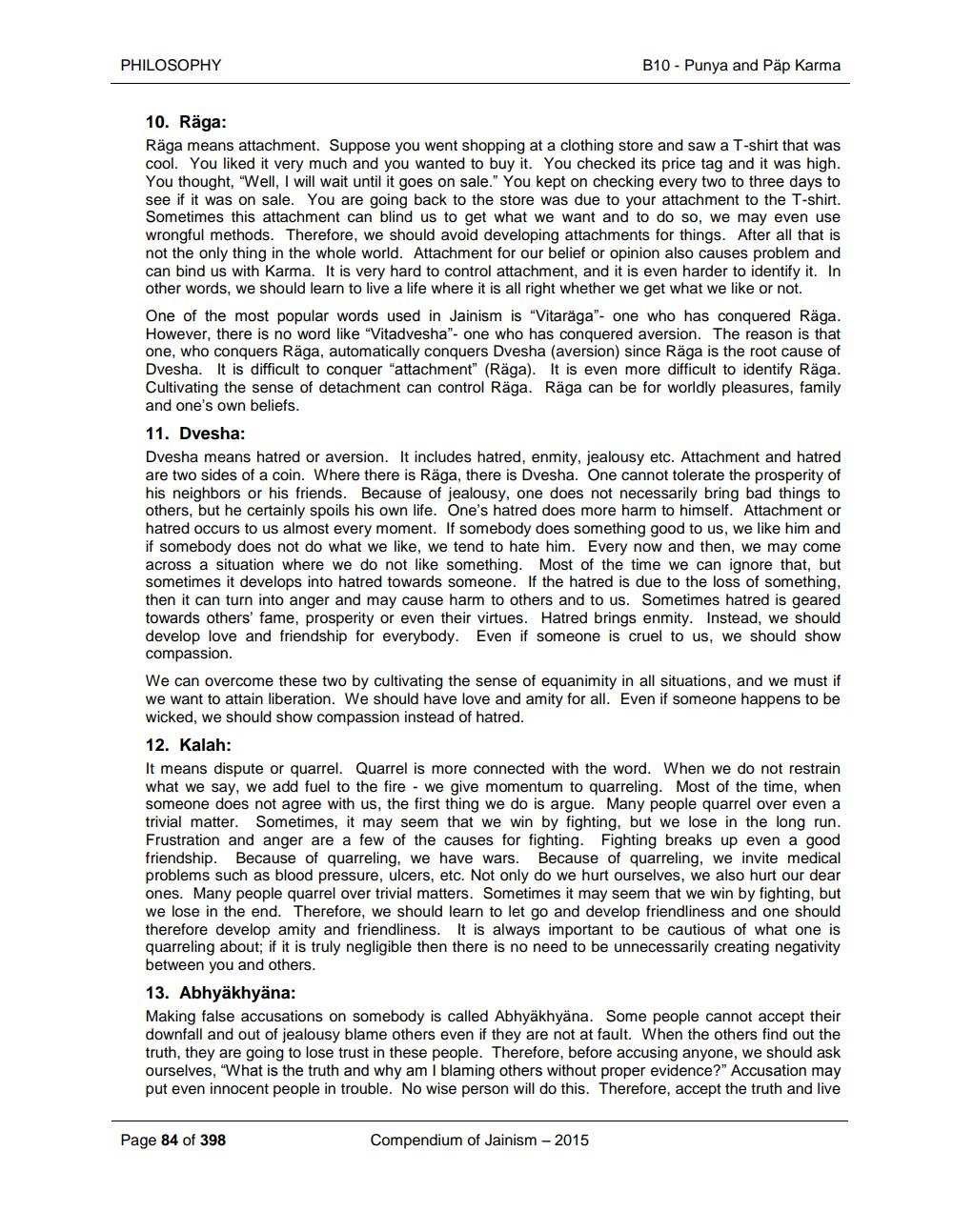________________
PHILOSOPHY
B10 - Punya and Päp Karma
10. Räga:
Räga means attachment. Suppose you went shopping at a clothing store and saw a T-shirt that was cool. You liked it very much and you wanted to buy it. You checked its price tag and it was high. You thought, "Well, I will wait until it goes on sale." You kept on checking every two to three days to see if it was on sale. You are going back to the store was due to your attachment to the T-shirt. Sometimes this attachment can blind us to get what we want and to do so, we may even use wrongful methods. Therefore, we should avoid developing attachments for things. After all that is not the only thing in the whole world. Attachment for our belief or opinion also causes problem and can bind us with Karma. It is very hard to control attachment, and it is even harder to identify it. In other words, we should learn to live a life where it is all right whether we get what we like or not.
One of the most popular words used in Jainism is "Vitaräga"- one who has conquered Räga. However, there is no word like "Vitadvesha"- one who has conquered aversion. The reason is that one, who conquers Räga, automatically conquers Dvesha (aversion) since Räga is the root cause of Dvesha. It is difficult to conquer "attachment" (Räga). It is even more difficult to identify Räga. Cultivating the sense of detachment can control Räga. Räga can be for worldly pleasures, family and one's own beliefs.
11. Dvesha:
Dvesha means hatred or aversion. It includes hatred, enmity, jealousy etc. Attachment and hatred are two sides of a coin. Where there is Räga, there is Dvesha. One cannot tolerate the prosperity of his neighbors or his friends. Because of jealousy, one does not necessarily bring bad things to others, but he certainly spoils his own life. One's hatred does more harm to himself. Attachment or hatred occurs to us almost every moment. If somebody does something good to us, we like him and if somebody does not do what we like, we tend to hate him. Every now and then, we may come across a situation where we do not like something. Most of the time we can ignore that, but sometimes it develops into hatred towards someone. If the hatred is due to the loss of something, then it can turn into anger and may cause harm to others and to us. Sometimes hatred is geared towards others' fame, prosperity or even their virtues. Hatred brings enmity. Instead, we should develop love and friendship for everybody. Even if someone is cruel to us, we should show compassion.
We can overcome these two by cultivating the sense of equanimity in all situations, and we must if we want to attain liberation. We should have love and amity for all. Even if someone happens to be wicked, we should show compassion instead of hatred.
12. Kalah:
It means dispute or quarrel. Quarrel is more connected with the word. When we do not restrain what we say, we add fuel to the fire - we give momentum to quarreling. Most of the time, when someone does not agree with us, the first thing we do is argue. Many people quarrel over even a trivial matter. Sometimes, it may seem that we win by fighting, but we lose in the long run. Frustration and anger are a few of the causes for fighting. Fighting breaks up even a good friendship. Because of quarreling, we have wars. Because of quarreling, we invite medical problems such as blood pressure, ulcers, etc. Not only do we hurt ourselves, we also hurt our dear ones. Many people quarrel over trivial matters. Sometimes it may seem that we win by fighting, but we lose in the end. Therefore, we should learn to let go and develop friendliness and one should therefore develop amity and friendliness. It is always important to be cautious of what one is quarreling about; if it is truly negligible then there is no need to be unnecessarily creating negativity between you and others.
13. Abhyäkhyäna:
Making false accusations on somebody is called Abhyäkhyäna. Some people cannot accept their downfall and out of jealousy blame others even if they are not at fault. When the others find out the truth, they are going to lose trust in these people. Therefore, before accusing anyone, we should ask ourselves, "What is the truth and why am I blaming others without proper evidence?" Accusation may put even innocent people in trouble. No wise person will do this. Therefore, accept the truth and live
Page 84 of 398
Compendium of Jainism - 2015




